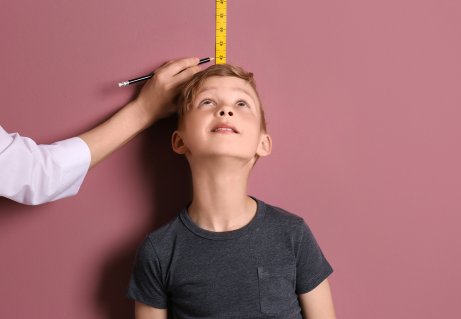When Do Boys Stop Growing and Developing?

Most parents know that a balanced diet is key when it comes to their children’s development. Yet diet isn’t the only deciding factor. Other factors also influence how children develop and when they stop growing.
What does growth involve?
Growth is a biological process that parents should always pay close attention to. It begins as soon as conception, and ends with the maturing of bone structures and sexual development.
Therefore, when we talk about growth, we’re not only referring to a child’s height. Rather, growth involves a series of changes that lead to the full functioning of a person’s body.
Among these changes we find body weight, hair growth, loss of teeth, and puberty.
Is there a way to predict how much my child will grow?
You may ask yourself “When do children stop growing?” However, it’s also common for parents to be curious as to how tall their children will be as adults.
Below, we’ll provide three formulas so that, together with your pediatrician, you can have an idea of how tall your children will be when they grow up.
- The most precise way to predict future height is using a child’s bone age. What you’ll need is an X-ray of your child’s left hand and wrist. With the image, your pediatrician will be able to evaluate how much cartilage remains available. Once cartilage closes, bones stop growing.
- Pediatricians can also use percentile tables and graphs. These will help determine if your child’s growth is within normal parameters. The numbers are based on a child’s height, weight and head circumference.
- The final method for predicting a child’s future height is by taking into account the height of both parents. Simply add the heights of both the mother and the father and divide by two. In the case of boys, you should add two and a half inches.
However, there’s no surefire way to know exactly how tall your child will grow up to be one day. Nor is there a precise method for knowing when your son will stop growing.
Both answers depend greatly on your child’s genetics and family history, and other influencing factors as well.

Factors that influence children’s growth
Besides genetic inheritance, there are other factors that also play a role in children’s growth and development. These include the following:
- Nutrition.
- Chronic illnesses.
- Exercise.
- Psychological well-being.
- Sleep patterns.
- The functioning of the endocrine system (hormones).
- Medication.
At what age do children grow the fastest?
Under normal conditions, children grow at an incredibly fast pace during the first 12 months of life. Over the course of this year, babies grow an average of 25 centimeters.
From the second year of life and onwards, children gain about 1 centimeter per month. However, puberty marks another period of rapid growth. In this case, the accelerated growth is extended over several years.
“Pediatricians can also use percentile tables and graphs that help determine if your child’s growth is within normal parameters. The numbers are based on a child’s height, weight and head circumference.”
When do boys stop growing?
In general, this second period of accelerated growth lasts between 2 and 5 years. In boys, it generally begins between the ages of 9 and 14.
During this stage, your child will experience the famous growth spurt that will determine his adult height. Those who take longer to reach puberty may continue growing until they reach the age of 20.
Others may even reach their maximum height after the age of 20. However, this occurs in only a few cases.
Therefore, two boys that have the same age may grow during different stages and at different rhythms. Just the same, both can still be within what are considered to be normal parameters.

If your child grows at a different rate than others
There’s no reason to run to the pediatrician’s office just because your child is shorter or taller than his peers.
However, if the difference is extreme, you can consult with a specialist. This way, the medical professional will determine if there are any growth issues.
In conclusion, parents’ DNA isn’t their only contribution to their children’s growth and development. They must also provide the nourishment, rest, physical activity and emotional support their children need.
Don’t forget that this is a stage full of drastic changes, and your children need your support to face them.
Most parents know that a balanced diet is key when it comes to their children’s development. Yet diet isn’t the only deciding factor. Other factors also influence how children develop and when they stop growing.
What does growth involve?
Growth is a biological process that parents should always pay close attention to. It begins as soon as conception, and ends with the maturing of bone structures and sexual development.
Therefore, when we talk about growth, we’re not only referring to a child’s height. Rather, growth involves a series of changes that lead to the full functioning of a person’s body.
Among these changes we find body weight, hair growth, loss of teeth, and puberty.
Is there a way to predict how much my child will grow?
You may ask yourself “When do children stop growing?” However, it’s also common for parents to be curious as to how tall their children will be as adults.
Below, we’ll provide three formulas so that, together with your pediatrician, you can have an idea of how tall your children will be when they grow up.
- The most precise way to predict future height is using a child’s bone age. What you’ll need is an X-ray of your child’s left hand and wrist. With the image, your pediatrician will be able to evaluate how much cartilage remains available. Once cartilage closes, bones stop growing.
- Pediatricians can also use percentile tables and graphs. These will help determine if your child’s growth is within normal parameters. The numbers are based on a child’s height, weight and head circumference.
- The final method for predicting a child’s future height is by taking into account the height of both parents. Simply add the heights of both the mother and the father and divide by two. In the case of boys, you should add two and a half inches.
However, there’s no surefire way to know exactly how tall your child will grow up to be one day. Nor is there a precise method for knowing when your son will stop growing.
Both answers depend greatly on your child’s genetics and family history, and other influencing factors as well.

Factors that influence children’s growth
Besides genetic inheritance, there are other factors that also play a role in children’s growth and development. These include the following:
- Nutrition.
- Chronic illnesses.
- Exercise.
- Psychological well-being.
- Sleep patterns.
- The functioning of the endocrine system (hormones).
- Medication.
At what age do children grow the fastest?
Under normal conditions, children grow at an incredibly fast pace during the first 12 months of life. Over the course of this year, babies grow an average of 25 centimeters.
From the second year of life and onwards, children gain about 1 centimeter per month. However, puberty marks another period of rapid growth. In this case, the accelerated growth is extended over several years.
“Pediatricians can also use percentile tables and graphs that help determine if your child’s growth is within normal parameters. The numbers are based on a child’s height, weight and head circumference.”
When do boys stop growing?
In general, this second period of accelerated growth lasts between 2 and 5 years. In boys, it generally begins between the ages of 9 and 14.
During this stage, your child will experience the famous growth spurt that will determine his adult height. Those who take longer to reach puberty may continue growing until they reach the age of 20.
Others may even reach their maximum height after the age of 20. However, this occurs in only a few cases.
Therefore, two boys that have the same age may grow during different stages and at different rhythms. Just the same, both can still be within what are considered to be normal parameters.

If your child grows at a different rate than others
There’s no reason to run to the pediatrician’s office just because your child is shorter or taller than his peers.
However, if the difference is extreme, you can consult with a specialist. This way, the medical professional will determine if there are any growth issues.
In conclusion, parents’ DNA isn’t their only contribution to their children’s growth and development. They must also provide the nourishment, rest, physical activity and emotional support their children need.
Don’t forget that this is a stage full of drastic changes, and your children need your support to face them.
This text is provided for informational purposes only and does not replace consultation with a professional. If in doubt, consult your specialist.








